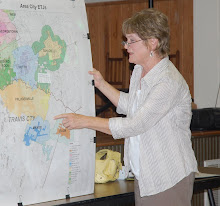The Statesman’s Ben Wear has provided an update on moving freight rail out of Austin to the Coupland area to make way for passenger rail on Union Pacific’s Austin line. Here’s the link to his column “A rail district by any other name still needs money.”
http://www.statesman.com/news/content/news/stories/local/2009/11/09/1109wear.html
Recently, the Austin-San Antonio Intermunicipal Commuter Rail District held a news conference to announce that they have changed their name to the Lone Star Rail District.
Wear notes, “[T]he train service is still mostly a line on a map. As agency board chairman Sid Covington says, the main obstacles to creating a commuter line between Austin and San Antonio are now and always have been Union Pacific freights and money. . . . To make commuter rail viable, almost all of Union Pacific's freight runs would have to be moved to new or refurbished tracks east of the existing tracks.”
The 2008 Central Texas Rail Relocation Study shows two alternatives for the freight rail—expanding the rail line that goes through Coupland or constructing a new line from Taylor to San Antonio through the countryside west of Coupland. Wear points out, “Rerouting the Union Pacific trains from Taylor . . . would cost anywhere from almost $900 million . . . to $2.4 billion. The rail district last year was saying that construction of the line itself would take another $600 million.”
The Lone Star Rail District hopes that TxDOT and Union Pacific will pay for the alternate freight route.
Wear reports, “As for the passenger rail construction — 16 stations, trains, track and signal improvements, maintenance facilities — Lone Star officials see TxDOT paying half, the other half split roughly in thirds among governments in the Austin area, Bexar County and Comal and Hays counties.”
Right now, there is no money for this construction. What is new now is the Rail District will receive $40 million from the Capital Area Metropolitan Planning Organization and the San Antonio Metropolitan Planning Organization for design work and the environmental process. Wear says that these studies will begin early in 2010.
Subscribe to:
Post Comments (Atom)

No comments:
Post a Comment